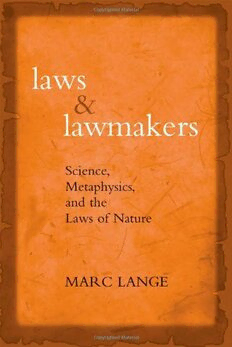Download Laws and Lawmakers: Science, Metaphysics, and the Laws of Nature PDF Free - Full Version
Download Laws and Lawmakers: Science, Metaphysics, and the Laws of Nature by Marc Lange in PDF format completely FREE. No registration required, no payment needed. Get instant access to this valuable resource on PDFdrive.to!
About Laws and Lawmakers: Science, Metaphysics, and the Laws of Nature
Laws of nature have long puzzled philosophers. What distinguishes laws from facts about the world that do not rise to the level of laws? How can laws be contingent and nevertheless necessary? In this brief, accessible study, Lange offers provocative and original answers to these questions. He argues that laws are distinguished by their necessity, which is grounded in primitive subjunctive facts (expressed by counterfactual conditionals). While recognizing that natural necessity is distinct from logical, metaphysical, and mathematical necessity, Lange explains how natural necessity constitutes a species of the same genus as those other varieties of necessity. Along the way, Lange discusses the relation between laws and objective chances, as well as such unjustly neglected topics as the completeness of the laws of physics and whether the laws of nature can change. Lange's elegant, engagingly written book is non-technical and suitable for undergraduate philosophers (and undergraduate scientists interested in the logical foundations of science). It is "must reading" for metaphysicians and philosophers of science working on laws, chance, counterfactuals, modality, or the philosophy of physics.
Detailed Information
| Author: | Marc Lange |
|---|---|
| Publication Year: | 2009 |
| ISBN: | 9780195328141 |
| Pages: | 276 |
| Language: | English |
| File Size: | 1.171 |
| Format: | |
| Price: | FREE |
Safe & Secure Download - No registration required
Why Choose PDFdrive for Your Free Laws and Lawmakers: Science, Metaphysics, and the Laws of Nature Download?
- 100% Free: No hidden fees or subscriptions required for one book every day.
- No Registration: Immediate access is available without creating accounts for one book every day.
- Safe and Secure: Clean downloads without malware or viruses
- Multiple Formats: PDF, MOBI, Mpub,... optimized for all devices
- Educational Resource: Supporting knowledge sharing and learning
Frequently Asked Questions
Is it really free to download Laws and Lawmakers: Science, Metaphysics, and the Laws of Nature PDF?
Yes, on https://PDFdrive.to you can download Laws and Lawmakers: Science, Metaphysics, and the Laws of Nature by Marc Lange completely free. We don't require any payment, subscription, or registration to access this PDF file. For 3 books every day.
How can I read Laws and Lawmakers: Science, Metaphysics, and the Laws of Nature on my mobile device?
After downloading Laws and Lawmakers: Science, Metaphysics, and the Laws of Nature PDF, you can open it with any PDF reader app on your phone or tablet. We recommend using Adobe Acrobat Reader, Apple Books, or Google Play Books for the best reading experience.
Is this the full version of Laws and Lawmakers: Science, Metaphysics, and the Laws of Nature?
Yes, this is the complete PDF version of Laws and Lawmakers: Science, Metaphysics, and the Laws of Nature by Marc Lange. You will be able to read the entire content as in the printed version without missing any pages.
Is it legal to download Laws and Lawmakers: Science, Metaphysics, and the Laws of Nature PDF for free?
https://PDFdrive.to provides links to free educational resources available online. We do not store any files on our servers. Please be aware of copyright laws in your country before downloading.
The materials shared are intended for research, educational, and personal use in accordance with fair use principles.

